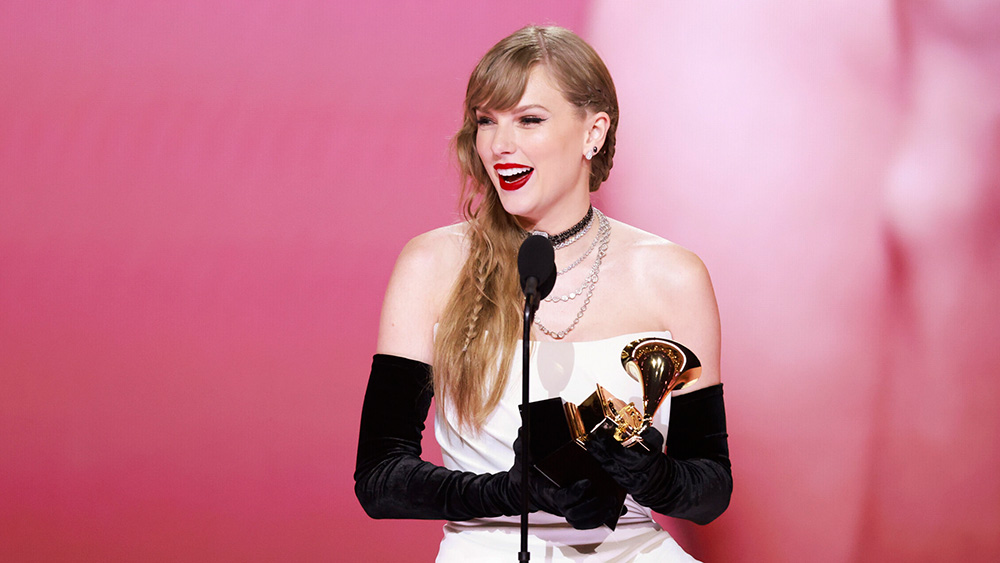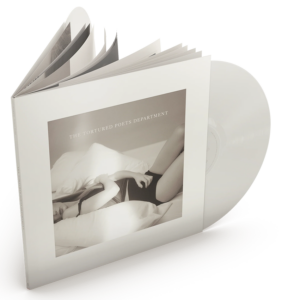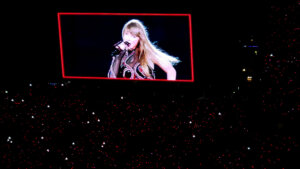
Taylor Swift accepts the award for Best Pop Vocal Album at The 66th Annual Grammy Awards Feb. 4 at the Crypto.com Arena in Los Angeles, California. Swift’s influence on music, culture, and global economics has become the topic of academic conferences dedicated to the performer. (Sonja Flemming/CBS photo)
Taylor Swift’s continued rise in popularity has helped define the post-pandemic zeitgeist — so much so that her influence has been the topic of academic conferences. The first major event centered on the singer — aptly named Taylor Swift: The Conference Era in honor of her ongoing global Eras Tour that celebrates the different eras of Swift’s career — was held in November 2023 at Indiana University Bloomington and covered a wide range of topics, from her internet presence to her lyricism to her relationship with fans.
“The keynotes were selected because they had done extensive research on Taylor Swift,” said Natalia Almanza, international program and operations coordinator for Indiana University Bloomington’s Arts & Humanities Council in an interview with Convene for the March/April 2024 issue’s edition of “There’s a Meeting for That.” But presenters weren’t necessarily “Swifties” — Swift’s devoted fans — which allowed for more critical conversations, Almanza said. Of 75 academic papers submitted, 20 submissions were selected, and 700 individuals attended, both students and members of the public.

Taylor Swift’s latest album, The Tortured Poets Society, drops at midnight April 19.
Just a few months later, halfway around the world, Swiftposium commenced. Held in February 2024 at the University of Melbourne in Australia and online, the academic conference took place just days before Swift brought her tour to Melbourne and Sydney. The event itself was exclusive to academics, but pre-con, RMIT University in Melbourne hosted a one-day “Fanposium” to include Swifties in the festivities.
Perhaps a symbol of the continuously rising “Swiftmania” around the world, Swiftposium was even bigger than Taylor Swift: The Conference Era. Organized with the support of Curtin University in Perth, Australia, and Auckland University of Technology in New Zealand, the event drew the attention of major media outlets and attracted more than 400 abstracts, with 130 accepted from 20 countries.
“Though many of us on the steering committee come from culture and media studies, we were conscious of keeping open the possibility of diverse interdisciplinary engagements with Swift,” the organizers wrote in a retrospective article about the event. Hannah McCann, senior lecturer in cultural studies at the University of Melbourne; Eloise Faichney, Ph.D., lecturer in the media and communications program at the University of Melbourne; Rebecca Trelease, Ph.D., senior lecturer at the Auckland University of Technology; and Emma Whatman, research fellow and sessional academic in gender and sexuality studies wrote in the article that their eagerness to reflect on Swift’s place in all aspects of culture resulted in panels that were, like at the Indiana University Bloomington event, widely diverse, ranging from literary studies, screen studies, publishing, and musicology to political science, economics, law, and critical race studies.
RELATED: Inside an Academic Conference About Taylor Swift
But despite both events’ wide range of discussions and strong interest from scholars, each conference sparked debate about the legitimacy of covering a non-traditional, seemingly frivolous topic in the halls of academia.
“Some assumed Swiftposium was simply a fan convention with no critical perspectives on Swift,” the Swiftposium organizers wrote. “For others, popular culture and specifically Swift is not serious enough for academic attention. Might it even be embarrassing for our universities to be associated with the pop star?” For cultural studies researchers, they said, the debate over why popular culture is worthy of academic attention has grown stale.
“We’re surprised to find that we still have to defend this space,” they wrote, adding that popular culture operates in an ever-shifting relationship with people’s ideologies, values, and emotions. “Why should we think that academia has nothing to say, or ought to have nothing to say, about major moments in popular culture, when these moments both shape and are shaped by contemporary society?”
The organizers pointed to Swift’s political and economic impact, in addition to her influence on the music industry — in September 2023, after a simple Instagram story directing her followers to Vote.org, 35,000 people registered to vote, representing a nearly 23-percent increase from the previous year, with a 115-percent increase in registrations by 18-year-olds. Meanwhile, the U.S. Travel Association believes her tour likely generated $10 billion in the U.S. last year, with fans spending an average of $1,300 in local markets to attend her show.
RELATED: When Riskies Meet Swifties

Taylor Swift performs at Chicago’s Soldier Field, where her Eras Tour sold out three shows June 2-4, 2024. (Elizabeth Doll/PCMA)
“On these topics, political scientists, economists, and musicologists have much to say,” the Swiftposium organizers wrote. The interdisciplinary space also allowed for unexpected discussions, they said, “such as how we can read Swift’s work in relation to gothic novels and autobiographical poetry, the limits of Swift’s feminist activism, her impact on #MeToo debates,” and more.
The discussions held during the event hold value both in and outside of the university setting, they wrote, noting that “using popular culture as a way into any field of study brings a new and immediate sense of relevance to students.” The event also served as a way for academic voices to reach the public sphere, they wrote, “and add critical voices to mainstream discussions.”
Likewise, Almanza defended Taylor Swift: The Conference Era’s gravitas. “The arts and humanities can be powerful tools to help us facilitate complex and critical discussions,” she told Convene. “The academic landscape does not need to be exclusive to those wanting to talk about what has been historically seen as ‘valid’ work — we can have incredible conversations about the arts and humanities around pop culture, celebrities, movies, TV shows, and fandoms. These topics can and should be valued as much as other, more traditional academic topics.”
Casey Gale is managing editor of Convene.
